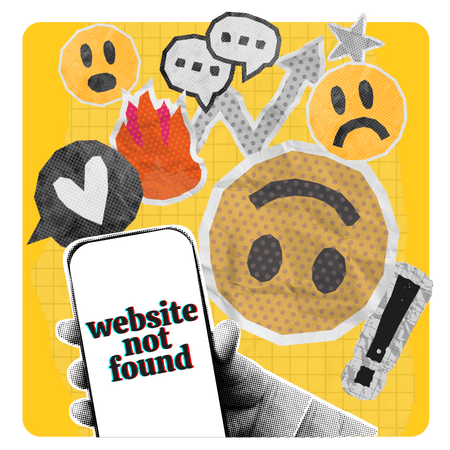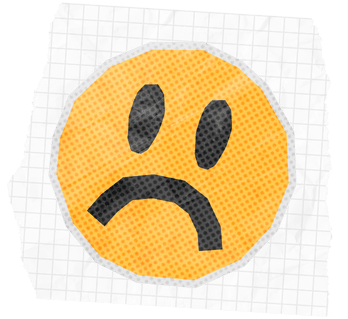The under 16s social media ban: the good, the bad and your brain
A guide for teens
"I'm losing my socials"
If you're under 16 and have lost your social media, you're in a difficult spot!
It sucks to have something and then get it taken away. It's really normal to feel things like grief, anger, relief, confusion, and more.
We know you have questions about what's happened, why, and whether it's a good or bad thing (or both). It's all a bit complicated, and honestly, a bit controversial too. We'll do our best to answer your burning questions in this article.
If you're looking for things to help you deal without socials, check out our coping and mental health guide.

This page covers...
The most important message we want you to remember...
Wah! Why are we being banned from social media?
Research shows that some common aspects of social media can negatively impact teen mental health.
The social media age delay is an example of science catching up with technological advancements, leading to legal changes.
Of course, there's good stuff about socials, as well as bad. But to understand the reasons behind the age delay, let's explore some of the common negative features of socials and the impact these have on your brain.

What's really happening inside your brain when on social media
The 'dopamine loop' and your mental health
Being on socials triggers dopamine, a feel-good chemical in the brain. There’s now evidence that social media can rewire the brain to crave more and more social media content, making it addictive. And the 'bottomless feed' (the endless scroll) makes it easy to accidentally doomscroll or dreamscroll for hours and hours and hours...
This does also affect adults, but it’s especially problematic for teen brains as the dopamine brain changes teens experience could be long lasting or even permanent.
'Attention currency' and your mental health
Social media algorithms are designed to keep you on their platform for long periods of time, and to make ‘switching off’ hard.
The algorithm doesn't just show you stuff you follow or like, it can also show you:
- rage-bait, i.e. extreme stuff that stuff that riles you up on purpose – because angry people click, comment and share more than happy people do
- ‘AI slop’, i.e. low quality AI generated stuff that isn't real
- misinformation and disinformation – aka 'fake news' that misleads you accidentally or deliberately; the algorithm doesn’t filter out truth from fact and will only share what’s popular (even if it’s untrue)
- content that’s actively harmful to you – stuff that triggers mental health issues, trauma or makes you feel distressed, aka 'doomscrolling'
- ads... so many ads that want you to buy! Buy! BUY! Teens are exposed thousands of advertisements every day (yes, thousands!). These ads can decrease your life satisfaction, make you more impulsive (especially with money) and influence you to overconsume
All this stuff combined can lead to 'cognitive overwhelm', a type of stress, burnout and exhaustion that can contribute to feeling anxious or depressed.
Other dangers
We know you’re probably already aware of stuff like spam, scams, and more. There are some very dark places on social media and people out there to cause harm.
Stuff like online abuse and cyberbullying can happen to anyone – and some people doing those things deliberately target teens.
Even the small negative bits can add up to affect your mental health. Seeing body shaming, bad news from around the world, or content that promotes hate and discrimination all takes a toll on wellbeing. Our brain just wasn't designed to be exposed to and process so much upsetting stuff.
Changes in law can be triggered by advances in science + people being harmed
Social media tech has evolved really quickly and the law has struggled to keep up with it.
It's not just people using social media for bad (criminal) activities. There are worker's rights for young content creators, copyright, data protection and privacy, ethical issues, environmental issues, and more.
Sadly, laws often change only after people have been harmed. For example, making seatbelts mandatory in cars.
Australia has other age-based laws designed to protect young people from harms (like making the legal drinking age 18).
The combination of the latest science around social media and the teen brain, as well as real life harms that have been done to young people using social media has resulted in the introduction of the 'under 16s social media age delay'.
What does a social media 'delay' mean?
The government passed a new law called the ‘Online Safety Amendment (Social Media Minimum Age) Bill 2024.
The under 16s social media ban is an ‘age delay’. It’s hoped that delaying teens being on social media (by changing the legal age from 13 to 16) will:
Give your brain more time to develop
Let's get real - puberty and hormones do a number on your brain. Your early teens are such an important time for brain development and mental health, and can set you up for good or challenging mental health in your later teens and even adult years. Protecting your brain from stuff that may be dangerous, distressing or addictive can help prevent problems and improve your wellbeing.
Give you more time to prepare for social media
There's so much to learn! And social media changes fast. The 'endless scroll' wasn't a feature of social media a few years ago. AI slop is relatively new as of 2025. When it comes to tech, stuff moves quickly, it's complicated, and you deserve the best education to be in control of your social media and wellbeing.
If you're looking for the latest info on the age delay (including what's banned and what's not), eSafety is your best source of info.
Why people think the age delay is a good idea
- social media has common features that can harm developing teen brains
- there are serious risks on social media for young people including harmful content, people trying to abuse or exploit teens, and cyberbullying
- there are data and privacy issues for under 16s
- an age-based ban may help parents keep their teens safer online
Some older teens support the age delay based on their own personal experiences when they were under 16. They want to protect their younger siblings and friends from going through what they went through.
The other side... why some people are against it
- under 16s will miss out on the good stuff about social media; this is especially concerning for teens who might not have in-person supports or community
- the ban will be hard to enforce; some teens may find risky ways around it
- games, apps, sites and platforms that aren't part of the ban aren't necessarily 'safe' for teens
- social media sites should be held more accountable to make things better and safer for younger users
Some adults (including parents) don't support the age delay, but because it's an actual law, parents can't give you 'permission' to be on socials under the age of 16.
I'm not worried... I have a way around the ban
Important: if you are under 16 and are on social media, and something bad happens – like cyberbullying, or sextortion – please still report it. You WILL NOT GET IN TROUBLE.
The ban isn’t about policing and punishing teens and their parents, it’s about making social media more accountable. If you experience something unsafe online, it's very important you still report it and seek help/support.
We know some teens have 'workarounds'. Just remember that being on social media – and finding ways around bans – still carries risks for your mental health and safety. The same is true for sites, platforms and apps that aren't part of the ban. Not being banned doesn't necessarily mean they're safe or without risks.
If anything unsafe happens, or you're struggling with the ban, Kids Helpline is here to support you. Also check out our guide to coping with the under 16s social media ban for ways to manage your mental health without socials.

Looking for more support?
Check these out too:
Coping with the under 16s social media ban
Strategies for coping with losing socials, social media withdrawals, and mental health ...
READ MESextortion: What it is and what to do about it
‘Sextortion’ is a type of image-based abuse that can happen online. If ...
READ MECyberbullying
If you’re experiencing cyberbullying, you’re not alone. It can be ...
READ MESocial media and mental health
Social media gets a pretty bad rap. It's true that it can ...
READ ME




